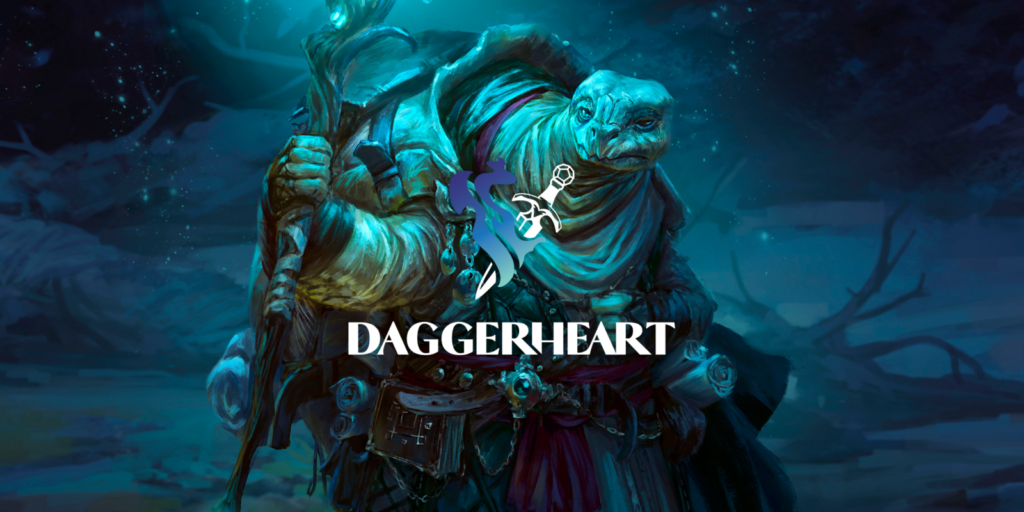
- Product: Daggerheart Open Beta
- System: Daggerheart
- Producer: Darrington Press
- Price: N/A
- TL; DR: An high fantasy DnD-like with a focus on narrative gameplay and combat mechanics that are aiming at telling a story that is „both heartfelt and epic“.
Summary
Daggerheart aims at being a high fantasy, heroic fantasy game with a focus on collaborative worldbuilding and narrative mechanics while still heavily relying on combat for conflict resolution. It borrows heavily from systems like Genesys, Cypher, PbtA and Blades and lovingly aknowledges the fact right from the start, which is something I personally appreciated. Here’s a few things that stood out for me.
System & Mechanics
Duality Dice
The central dice rolling mechanic revolves around the generation of two liquid resources called Hope and Fear. The players roll 2d12, add them up and check against a Difficulty threshold established by their GM to determine general success or failure. In addition the higher of the two dice defines whether you add Hope (something good happens) or Fear (something bad happens) to the result.
This adds nuance and narrative flovour to ability checks and attack rolls and generally leads to exciting or interesting complications for the story without the weight or complexity of systems like Genesys. Hope and Fear are also used by the players and GM respectively to fuel some of their abilities, spells and mechanics.
Character Creation
Character creation felt straightforward, easy and quick. The Background and Connections questions that are part of the creation process really help in quickly attaching your character to the world and party. The fact that Daggerheart did away with rolling Ability Score and just went with an array of modifiers helps simplify the process. While Demiplane provides all the information in a consolidated character sheet, for players preferring the haptic physical experience, the game provides abiltity and spell cards for character keeping in addition to the classic character sheet.
Experiences
Experiences are as nice step away from DnD’s very crowded Proficiency system towards FATE Aspects (so I’ve been told. I have never played FATE). Instead of selecting skills, the players choose a word or phrase that embodies something distinctive about their character (one example from Critical Role’s Session Zero was „Sticky fingers“ for a player’s Rogue character). These Experiences are that make your character excel at something and should be interesting, unique and always part of their personality or background. While that sounds exciting this can be sometimes hard to nail might require some negotiation and workshopping between players and GM.
Combat
We used Demiplane to run the session (and I have a lot of questions regarding their UI/UX design) and handling combat in the digital character sheet with full integration of all the trackers felt great.
Tracking Hitboxes, Armor Slots, Hope and for some classes additional resources on a paper sheet could feel a bit clunky and cumbersome, but in a digital medium even playing for the first time felt pretty straightforward.
Abilities and Spells
Judging from my character sheet (I played an Orc Wordsmith aka Bard) every ability felt exciting and meaningful. We always felt like we had something cool or exciting to do or contribute.
Downtime
Unfortunately we did not find the time for neither a Short or Long Rest, but the game tries to provide a meaningful structure for downtime, allowing players to choose from a set of activities in order to heal damage or stress, repair armor or prepare for the challenges ahead.
I’d be interested to see how that plays out in real time and I can imagine some interesting Camp montages being narrated while the cree rests around the campfire.
World Theme
We had no chance in delving deeper into the worldbuilding mechanics, but from a first look, there’s really not much provided in terms of information or given world lore. As far as we could see the game provide tools and mechanics to generate a campaign world collaboratively at your table , although we couldn’t tell whether they where as thought-out as the ones from ‚A Quite Year‘
Conclusion
Overall, It feels like Daggerheart ingrains a lot of tools and mechanics in its DNA for the sake of its (better, smoother, more interesting?) gaming experience.
I definitely wouldn’t call it a rules-light system, and in places it still feels as clunky and combat-centric as 5e. But it’s definitely choosing a more narrative approach, that’s very well supported by its mechanics to deliver a pretty well-rounded DnD-like that will definitely appeal to groups who’d like their D&D experience to be more narrative and flavourful, but don’t want to ditch their Tiefling Bard for another game system!

